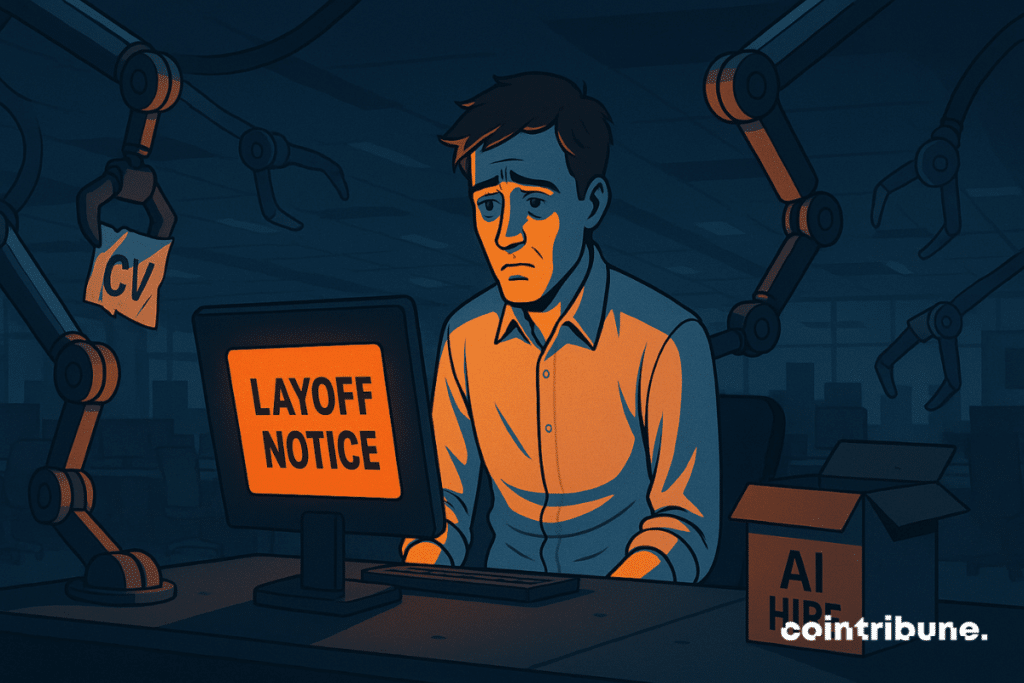OpenAI Takes on LinkedIn with AI-Powered Job Platform
As artificial intelligence radically transforms the job market and particularly threatens several positions, OpenAI launches an ambitious counter-offensive. The parent company of ChatGPT is developing a job platform specialized in AI, positioned as a direct competitor to LinkedIn.

In brief
- OpenAI launches an AI-powered job platform, expected by mid-2026.
- The project comes with a certification program targeting 10 million Americans by 2030.
- Young workers aged 22-25 suffer a 13% job decline in sectors most exposed to AI.
- Giants like Salesforce and Klarna have already cut thousands of jobs thanks to AI agents.
The irony of OpenAI, creating jobs after destroying them
OpenAI officially announced the launch of its job platform, called OpenAI Jobs Platform, with deployment planned for 2026. The goal is clear: to connect employers with candidates possessing artificial intelligence skills.
According to Fidji Simo, Chief Applications Officer at OpenAI, this initiative already relies on partnerships with industrial giants such as Walmart and John Deere, to facilitate the transition to a labor market reinvented by AI.
This announcement comes in a paradoxical context. On one hand, generative AI radically transforms the professional landscape by automating many tasks. On the other, it creates new needs for specialized skills.
A study from Stanford University’s Digital Economy Lab reveals that young workers aged 22 to 25 suffer a 13% drop in employment in sectors exposed to automation, illustrating this tension between job destruction and creation.
To support this mutation, OpenAI is also launching a free certification program called “AI Fluency.” A pilot phase will be offered from the end of 2025, with the ambition to certify 10 million Americans by 2030. This initiative reflects the company’s recognition of its responsibility in transforming the labor market.
A generation crushed by automation and the rise of AI
Generation Z pays the high price of this technological revolution. Entry-level positions, long considered stepping stones for young graduates, are disappearing rapidly.
Marc Benioff, CEO of Salesforce, illustrates this trend: he has reduced his customer service from 9,000 to 5,000 employees, replaced by AI agents capable of managing over one million conversations.
This transformation hits sectors like software development and customer support hard. According to the International Labour Organization, the rise of generative models—capable of producing voice, images, and videos—has strongly increased automation scores.
Result: young professionals find themselves deprived of opportunities that traditionally allowed them to gain initial experience.
At the same time, Sam Altman, CEO of OpenAI, promotes an optimistic view of the situation, considering that the current era represents an exceptional moment to start a career. A striking contrast with the daily reality of a generation facing a job market already reshaped by automation.
The emergence of a new professional paradigm
OpenAI’s initiative is part of a broader shift towards what experts now call agentic AI.
Unlike earlier language models, which were limited to generating text, new AI agents can perform concrete actions: conducting online research, running code, booking a plane ticket, or making a call. This evolution challenges the relevance of giant, costly, and energy-intensive models, favoring more modular and efficient approaches.
This transition deeply redefines working methods. Tools like DeepResearch allow compiling reports in minutes that would have taken hours, while v0 by Vercel transforms simple ideas into ready-to-use web applications.
In this new landscape, developers become solution architects, analysts turn into data strategists, and technicians evolve into intelligent system orchestrators.
But this mutation demands rapid skills adaptation. OpenAI’s future platform could play a central role by linking trained talents to concrete market needs. A sensitive question remains: the concentration of power in the hands of tech giants, who design both the tools and the skill standards needed to use them.
In reality, OpenAI seeks to solve a problem it has itself helped create. Its initiative illustrates the scale of ongoing upheavals and underscores the urgency of supporting workers through this technological transition.
Maximize your Cointribune experience with our "Read to Earn" program! For every article you read, earn points and access exclusive rewards. Sign up now and start earning benefits.
Passionné par le Bitcoin, j'aime explorer les méandres de la blockchain et des cryptos et je partage mes découvertes avec la communauté. Mon rêve est de vivre dans un monde où la vie privée et la liberté financière sont garanties pour tous, et je crois fermement que Bitcoin est l'outil qui peut rendre cela possible.
The views, thoughts, and opinions expressed in this article belong solely to the author, and should not be taken as investment advice. Do your own research before taking any investment decisions.